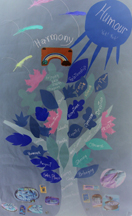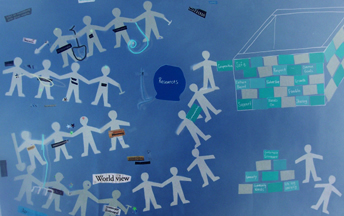The Learning Circles Project |
||
| The Question - How we got here by Guy Ewing |
||
This research project began with a meeting at the Metro Toronto Movement for Literacy (MTML), a network of literacy programs in Toronto and York Region, in the spring of 2002. The Movement for Canadian Literacy (MCL), a national literacy coalition, had just released its National Action Plan for Literacy for feedback, and MTML called a meeting to discuss the plan and elicit a response from Toronto area literacy workers. This meeting attracted a group of literacy workers with a wide range of experience in literacy work, in Toronto and in other parts of Canada. Our experience included various kinds of program work, research-in-practice, academic research, program administration, advocacy, planning and policy development. The group shared a social justice perspective on literacy work, the view that literacy work should be focused on personal development and social equity more than on meeting the ever-changing needs of the Canadian labour force. A central element of the National Action Plan was the goal of developing a national adult education system. The group that gathered that day at MTML felt that this was a positive goal, but was concerned that such a system might become focused on academic learning in academic environments. For many adults in Canada, access to learning means more than access to academic learning. It means access to learning of all kinds, learning that is meaningful in their particular contexts, and that helps them to move forward in their lives. Academic learning leads to academic credentials, and this can be important to adults who lack these credentials. But for many adults, the impetus to learn does not come from the need for academic credentials. Many essential kinds of learning are not even suited to an academic learning environment. Learning about our cultures, our communities, ourselves; these kinds of learning often beg for environments that are quite different from what we experienced in high school. And as literacy workers, we were well aware that written language, the staple of academic learning, is not the only medium for learning, and not always the best medium. It can be a barrier to learning, not only because it makes learning inaccessible to Canadians who have difficulty using written language, but also because it is simply not always the best medium for learning. By privileging written language, academic learning environments exclude people from learning, and they also exclude important kinds of learning. At the same time, as literacy workers, we had observed over the years that literacy learning is often most effective when it is embedded in other learning. Often, it is through engagement with learning about culture, community, self that the detailed scribblings of written language begin to make sense, that marks on a page begin to take on meaning. So it seemed to us that opportunities to learn outside of academic learning environments were also opportunities to acquire basic literacy. Non-academic learning environments let people in by not privileging literacy. They eliminate literacy as a barrier to learning. Paradoxically, by doing this, they create ideal environments for literacy learning to occur. So we responded to MCL’s National Action plan by calling for “inclusive lifelong learning” as a goal. Adults with less formal education should have access to informal learning opportunities that respects their knowledge and learning needs and does not require the use of written language as a prerequisite to learning. We decided to continue to meet. We named ourselves “The Lifelong Learning Working Group”. After several energizing discussions, we decided that we should start “doing something” about our ideas. With the help of developmental funding from the National Literacy Secretary, we began to develop a proposal for a project. We researched the literature on inclusive community learning. Against the background of Nayda Veeman’s studies of adult education in Sweden (Veeman, M. Nayda (2004). “Adult Learning in Canada and Sweden: A Comparative Study of Four Sites.” Ph.D dissertation, Department of Education Administration, University of Saskatchewan. Available at http://www.nald.ca/fulltext/sweden/cover.htm.), we discussed the Swedish learning circles, which provide, with government support, education for adults through informal learning focused on the interests of the participants. We explored the idea of piloting inclusive community learning centres; this would certainly be “doing something,” and appealed to us as community activists. But, as we talked, piecing together what we knew and were learning about community learning, remembering experiences in different parts of Canada, we began to realize that we should perhaps become less focused on doing and more focused on looking and listening. We were getting glimpses and flashbacks of the inclusive community learning that we already have in Canada. This inclusive community learning, we began to understand, is often not seen, because it is not understood as learning. One of us remembered a tenants’ group that a learner in a literacy program had organized. Another remembered attending talking groups in Nunavut. We had started with the idea of developing a project that created inclusive community learning opportunities, but humbled by what little we knew about existing kinds of inclusive community learning, we decided to develop a project to make more visible and to better understand this kind of learning as it currently exists in Canada. In our project proposal, we described this kind of learning as an “unacknowledged resource”. To carry out this project, we developed a partnership among three organizations, MTML, The Bay of Fundy Marine Resource Centre in Digby, Nova Scotia, an organization that supports learning and research in the rural, natural-resource-based communities in the Bay of Fundy area, and the National Indigenous Literacy Association (NILA), an organization that supports literacy learning in Indigenous communities throughout Canada. This partnership allowed us to explore inclusive community learning in a range of Canadian communities: urban, rural and Indigenous. It was important to us to include Indigenous communities in our research because of their long tradition of oral learning. Researchers were hired from each of the partner organizations, and became members of the Working Group on Lifelong Learning. A facilitator was hired, to facilitate the Working Group, to coordinate the work of the researchers, and to coordinate with MTML in providing project management. The Working Group continued to provide intellectual direction to the project. More than an advisory group, it was a learning circle, a place of discussion and discovery. The researchers became an inner circle within the Working Group, meeting frequently in person or by phone to develop the project, to write and to discuss. As the project comes to a close, the Working Group is discussing its future role. We believe that the issues and ideas that brought this group together will continue to sustain discussion, networking, and possibly future projects by this group. As long as we are a learning circle where we can continue to learn and grow, we will continue.
|
||

